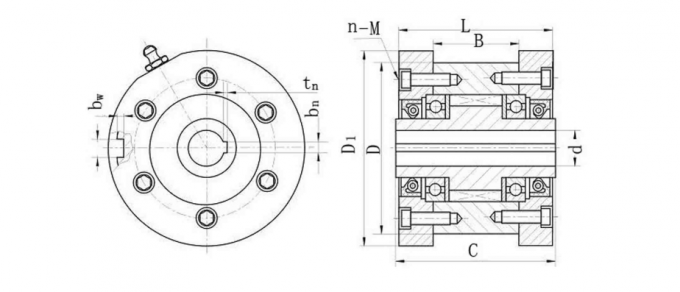Nov . 04, 2024 19:32 Back to list
Types of Spherical Bearings and Their Suppliers in the Market
A Comprehensive Guide to Spherical Bearing Types and Suppliers
Spherical bearings are critical components in various mechanical systems, offering a unique ability to accommodate angular misalignment between connected parts. They are designed to allow movement in multiple directions, making them ideal for applications in automotive, aerospace, industrial machinery, and robotics. Understanding the types of spherical bearings available and the suppliers that provide these components is essential for engineers and purchasing professionals alike.
Types of Spherical Bearings
1. Plain Spherical Bearings These are the simplest form of spherical bearings and consist of a spherical outer surface and a plain inner surface. They are typically made from materials like bronze or other metals and are ideal for applications requiring low friction and minimal wear.
2. Self-Aligning Bearings These bearings are designed to accommodate slight misalignments in the shaft and housing. They usually feature a spherical outer raceway and can handle both radial and axial loads. Self-aligning spherical bearings are often used in applications where assembly conditions may not be ideal.
3. Rolling Element Spherical Bearings Incorporating rolling elements, such as balls or rollers, into their design, these bearings reduce friction significantly compared to plain bearings. They provide higher load capacities and are suitable for high-speed applications.
4. Hydraulic Spherical Bearings These bearings utilize hydraulic fluid to facilitate movement, offering significant advantages in terms of load-bearing capabilities and shock absorption. They are commonly found in heavy machinery and construction equipment.
5. Composite Spherical Bearings Made from advanced composite materials, these bearings are lightweight and resistant to corrosion. They are particularly useful in aerospace applications where weight reduction is critical.
6. Maintenance-Free Spherical Bearings Often made with self-lubricating materials, these bearings reduce maintenance requirements and operate effectively in harsh environments. They are ideal for applications where access to the bearing is difficult.
Selecting a Spherical Bearing Supplier
When it comes to sourcing spherical bearings, the choice of supplier can significantly impact operational efficiency and cost-effectiveness
. Here are some factors to consider when selecting a supplier1. Product Range Ensure that the supplier offers a comprehensive range of spherical bearing types to meet diverse project requirements. This versatility can save time and cost in procurement.
2. Quality Assurance Look for suppliers who adhere to international quality standards, such as ISO 9001. High-quality bearings not only enhance performance but also extend the lifespan of the machinery they are part of.
spherical bearing types suppliers

3. Technical Expertise A knowledgeable supplier can provide valuable insights into which type of bearing is best suited for a specific application. Suppliers with engineers on staff can assist with troubleshooting and design modifications.
4. Lead Times and Availability Timely delivery is crucial in the manufacturing sector. Choose suppliers who can guarantee quick turnaround times and have a robust inventory management system to prevent delays.
5. Customization Options Some projects may require unique specifications. Suppliers who offer customization services can cater to niche needs, providing tailored solutions that standard products cannot.
6. Customer Support Excellent after-sales support is essential. Choose a supplier that offers technical assistance and responsive customer service to address any issues that may arise post-purchase.
Notable Suppliers of Spherical Bearings
1. The Timken Company Renowned for its high-quality bearings, Timken offers a wide array of spherical bearings for various industrial applications.
2. SKF A global leader in bearing technology, SKF provides innovative solutions, including self-aligning bearings and hydraulic spherical bearings.
3. Parker Hannifin Specialized in motion and control technologies, Parker offers a range of maintenance-free composite spherical bearings suitable for demanding environments.
4. FAG Bearings A part of the Schaeffler Group, FAG is known for its extensive range and superior engineering in bearing technology.
5. NSK Renowned for their precision and reliability, NSK provides various bearings, including those designed for high-speed applications.
Conclusion
Spherical bearings play a vital role in the functionality of numerous machines and systems. By understanding the different types of spherical bearings and carefully selecting a reliable supplier, companies can enhance their operational efficiency and ensure the longevity of their machinery. Investing in quality spherical bearings and forging strong supplier relationships is crucial for any business seeking to maintain a competitive edge in today's dynamic market.
Latest news
-
25MM 2 BOLT UCFLX05-14 Flange bearing unit( oval)
NewsMar.07,2025
-
4 bolt UCF 200 series Pillow block bearings
NewsMar.07,2025
-
25MM 2 BOLT UCFLX05-14 Flange bearing unit( oval)
NewsMar.07,2025
-
UCF216-50 4-Bolt Flange Housing Square Bearing
NewsMar.07,2025
-
25MM 2 BOLT UCFLX05-14 Flange bearing unit( oval)
NewsMar.07,2025
-
spherical roller bearing material exporter
NewsMar.07,2025





